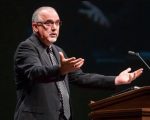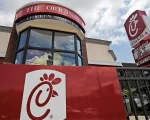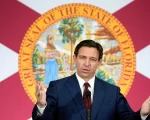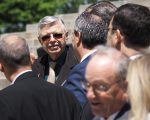Ted Cruz Criticizes Baptist Pastor for Defense of Executing Gays
U.S. Senator Ted Cruz publicly criticized fellow prominent Southern Baptist Tom Ascol for defending legislation that imposes the death penalty for “aggravated homosexuality.”
Oklahoma School Board Approves What Would Be the 1st Taxpayer-Funded Religious School in Us
A state school board in Oklahoma voted Monday to approve the first publicly funded Christian school in the nation, despite a warning from the state’s attorney general that the decision was unconstitutional.
Eat Mor Wokeness?
This issue of A Public Witness tastes the newest corporate controversy being fried up on social media and then digests the warning this “anti-woke” effort should signal for Christians.
Mister Rogers Lego Prototype a Tribute to His ‘Deep Spiritual Resonance’
Mister Rogers' Neighborhood could again become a household fixture, this time in the form of a Lego set.
DeSantis’ Spiritual-Warrior Style a Bid for Support From Like-Minded Pastors
With growing uncertainty surrounding evangelical support for former President Donald Trump, DeSantis is courting one of the Republican Party’s most sought-after constituencies.
New Asylum Policies After Title 42 ‘Don’t Address Root Cause,’ Say Faith-Based Groups
New policies that took effect last week are exacerbating the strain on many shelters on the southern side of the United States-Mexico border.
Church and State: Devotion Infuses Kansas Legislature, With Spiritual Adviser and Daily Prayers
While Rep. Emil Bergquist’s recent a cappella rendition of “The Lord’s Prayer” was new, the dedication to religion in the Statehouse was not.
Parable of a Bad Samaritan
The reflex to support certain types of violence has led to the quick canonization of vigilantes as new American saints. So this issue of A Public Witness documents this trend in recent political discourse and considers the dangerous gospel it preaches.
Latino Faith Leaders to Gather for Summit on Christian Nationalism
Christian nationalism has ‘infiltrated’ the Latino Christian community ‘in such a powerful way,’ said one clergyman, ‘that they are not even aware of the position they are supporting.’
Michael Flynn’s Soup for the Soulless
This issue of A Public Witness highlights some Christians challenging the rhetoric of Michael Flynn and others at the ReAwaken America Tour before offering a theological reminder about how we talk about those with whom we disagree.










